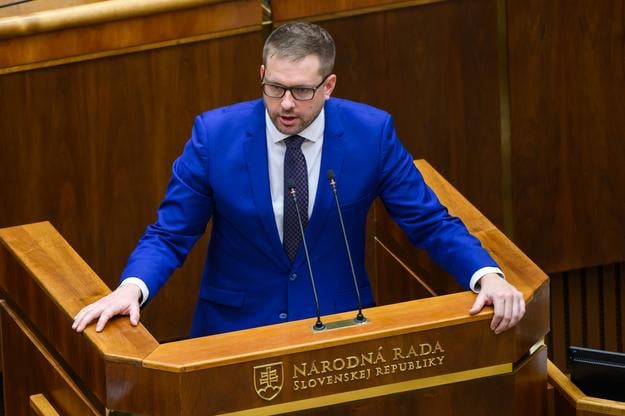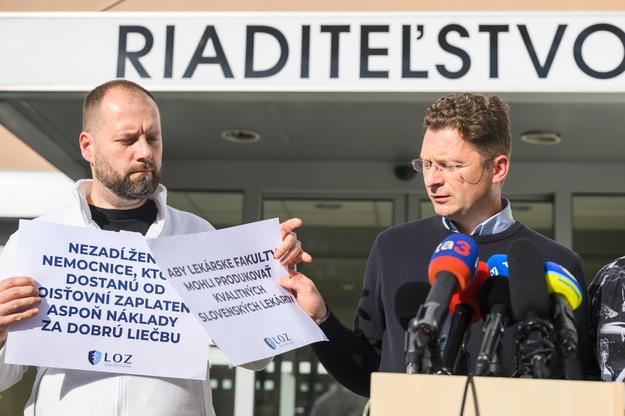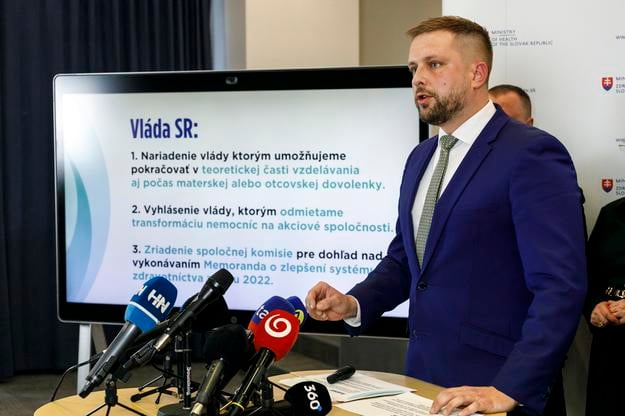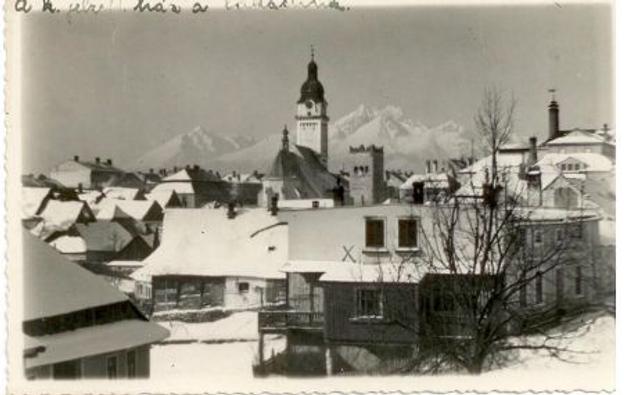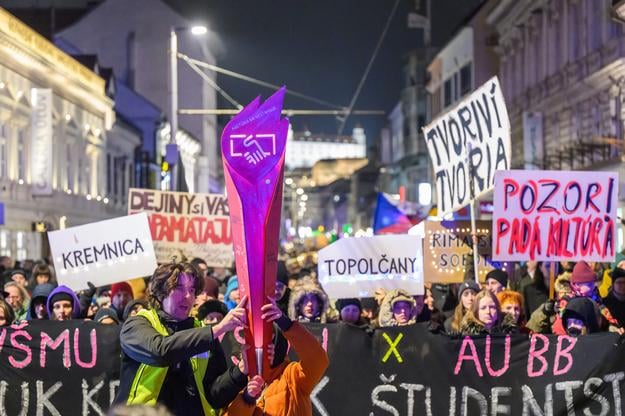Good to have you with us! Here is the latest edition of Today in Slovakia - all the top news from Thursday, wrapped up in one place!
Crisis grows, but the PM remains out of sight
The government of Prime Minister Robert Fico (Smer) has yet to reach an agreement with the union representing hospital doctors, raising the spectre of another healthcare crisis in Slovakia at the start of the new year. Around half of the country’s hospital doctors—approximately 3,300, according to November data—have submitted their resignations, which are set to take effect at the end of December.
Negotiations between the union, led by Dr Peter Visolajský, and the relatively new health minister, Kamil Šaško of the Hlas party, are ongoing but far from conclusive. The union has insisted that the resignations will only be withdrawn if the government honours a 2022 memorandum signed by the former administration of Eduard Heger. The memorandum includes commitments to reform medical education, increase funding for the healthcare system, and ensure steady pay rises. However, the Fico government has unilaterally curtailed the agreed pace of salary growth as part of austerity measures, costing doctors hundreds of euros annually.
Prime Minister Fico has argued that hospital doctors already earn significantly more than the national average wage, but the doctors counter that their demands are not about pay but about principles they believe the government has violated.
In a radio interview on Thursday, Minister Šaško stated that salaries for hospital doctors who do not operate private practices would continue to increase in line with the memorandum, while those who also run private surgeries would see slower wage growth.
“Dr Visolajský rejected this proposal,” the minister claimed.
Šaško claims to support the memorandum and insists that many of its points have already been fulfilled, though some are unlikely to be completed by the year’s end. He also said that union representatives have not provided a clear list of what has and has not been achieved. The minister called for the inclusion of other stakeholders, such as insurers and private doctors, in the talks—a move Visolajský reportedly opposes.
“If this isn’t about pay, there’s no reason to maintain the resignations,” Šaško told parliament on Wednesday.
With no deal in sight, coalition MPs narrowly passed government-endorsed measures on Wednesday that allow for an emergency situation to be declared for up to four months in regions where the provision of healthcare might be at risk. The measures could impact up to 12 regions.
“Forced labour”: Doctors who have handed in their resignations could face strict consequences under new measures approved by the parliament. Doctor Visolajský has sharply criticised the changes, labelling them as “forced labour.” He argues that this coercive approach “will not work.” If the government declares an emergency situation in December, resignation periods will be suspended, forcing doctors to return to work. Failure to comply could result in a one-year prison sentence. Visolajský’s criticism recalls a similar crisis in September 2011, when over 2,000 doctors left hospitals in protest against the government of Iveta Radičová, which had refused their demands. The government only signed a memorandum, similar to one negotiated in 2022, days before a total collapse of hospitals in Bratislava and northern Slovakia seemed inevitable. Back then, the government imposed stricter emergency measures in certain regions, but many doctors resisted by claiming to be unfit for work despite the threat of penalties.
Missing PM: Prime Minister Robert Fico, who previously criticised his predecessors during major crises, is facing scrutiny for his own absence as Slovakia grapples with its healthcare emergency. In 2011, as an opposition MP, Fico lambasted the then-government over the exodus of doctors, remarking: “This is the result when an incompetent prime minister and a stubborn trade unionist sit at the same table.” A decade later, in 2022, Fico questioned the government’s inaction during a healthcare workers’ strike, saying: “The government pretends nothing is happening. Nobody is negotiating; they’re ignoring the unions’ demands. We’re pushing for the government to sign a memorandum with doctors, for heaven’s sake, so they return to work. Otherwise, Slovak healthcare will collapse completely. Such a situation has never occurred before. Where is the prime minister? PM Heger is busy attending military exercises across Europe…” These sharp critiques, in part, helped Fico win the parliamentary elections. Yet, the tables have turned. Opposition figures are now circulating Fico’s past statements in videos, accusing him of hypocrisy as he remains conspicuously absent during Slovakia’s current healthcare crisis. Fico has been on an official visit to Brazil for several days, leaving the health minister to address the ongoing dispute with medical unions. The prime minister has maintained that healthcare is not a “prime ministerial issue” and that pay negotiations for future years have crossed a “red line.” Despite mounting pressure, Fico has yet to meet with union leaders, dismissing their demands as solely salary-driven.
Talks rejected: On Thursday, Visolajský refused to meet with the health minister, citing his opposition to the involvement of other groups in the negotiations. In response, the minister did not attend, but discussions proceeded between various healthcare stakeholders and representatives from the ministries of health and labour. Meanwhile, the unions have urged President Peter Pellegrini not to sign emergency policy changes passed by parliament, claiming the measures “exceed the boundaries of democracy.” They have requested a meeting with the president to address their concerns. Pellegrini, a former leader of the coalition party Hlas, which oversees the Health Ministry, retains some influence as the party’s honorary chair. Given his political ties, it is believed that he will approve the controversial legislation.
Other stakeholders: The daily newspaper SME sought perspectives from other healthcare organisations, including the Slovak Hospitals Association and the Association of Private Doctors. These groups believe that the unions’ primary focus is on securing higher salaries for doctors, even though they acknowledge that doctors’ wages are already substantially higher than those of nurses and paramedics. According to the 2022 memorandum, the basic salary for a junior doctor this year stands at nearly €1,817, while that of a senior doctor is just under €3,028.
Fico failed: The conservative outlet Postoj interviewed Vladimír Baláž, a doctor and long-serving MP for Robert Fico’s Smer party, who also heads the parliamentary health committee. Baláž admitted that the government’s decision to adjust doctors’ pay without consulting them was a mistake. He further acknowledged that Smer neglected healthcare during its time in power. “In Smer, we should have given more thought to what we wanted healthcare to look like,” he said. Baláž added that Fico would eventually have to address the current crisis directly.
MORE STORIES FROM THE SLOVAK SPECTATOR
Playgrounds in the dark: Bratislava’s playgrounds empty out in winter as early sunsets and dim lighting leave children and parents navigating by touch.
What Slovakia Googled in 2024: From simple questions to Robert Fico.
Košice embraces its new residents: With 22,000 foreign residents, Košice unveils its first integration strategy to foster a more inclusive city.
A chimney with a story: In Utekáč, a lone chimney from an 18th-century glassworks is reimagined as a tourist attraction, aiming to draw visitors from across the globe.
If you like what we are doing and want to support good journalism, buy our online subscription with no ads and subscribe to our newsletters.
HISTORY TALKS
Mountain meadow wars
The picturesque Spišská Belá, with its Renaissance belltower and High Tatras backdrop, hides a bloody tale of territorial strife. For centuries, the Rakúska poľana meadow was a battleground for neighbouring towns, culminating in a violent clash in 1701 that even royal intervention failed to resolve. A rock engraved with initials aimed to bring peace — but only kept the conflict alive.
FREE BRATISLAVA EVENTS
Kimyan Law
Immerse yourself in the spellbinding sounds of Kimyan Law, a Congolese-Austrian artist who fuses traditional African instruments with modern electronic beats. His live performance promises a unique blend of warmth, originality, and dreamlike soundscapes — all for free in Bratislava this week.
IN OTHER NEWS
Bratislava’s city council has passed a new budget that includes higher public transport fares starting in March. The price of a standard 30-minute ticket will rise from €1.10 to €1.20, while an annual tram pass will increase from €239 to €263. (Denník N)
EU interior ministers have formally approved the full accession of Bulgaria and Romania to the Schengen Area, the EU’s border-free travel zone, effective from 1 January next year. The decision was finalised during a meeting in Brussels.
Slovakia has successfully negotiated a six-month extension to its exemption from the EU ban on Russian oil imports, allowing it to continue exporting fuel and petroleum products to the Czech Republic beyond the New Year. The final approval is expected on Monday at the Council of Ministers in Brussels. Without the extension, Russian oil delivered via the Druzhba pipeline would have been restricted to domestic production and exports to Ukraine after December 5, 2024. (SITA)
Chanting “We won’t be silent! United we stand! Martina, resign!”, over 5,000 demonstrators marched from SNP Square to Freedom Square in Bratislava on Thursday evening. The protest was directed against the controversial actions of Culture Minister Martina Šimkovičová (nominated by SNS) and her right-hand man, Lukáš Machala. (SME)
WEATHER BRIEFING: Friday will be mostly sunny with a touch of scattered clouds to keep things interesting. Temperatures will hover between a frosty -2°C and a more agreeable 4°C — so bundle up, but don’t forget your sunglasses! (SHMÚ)
PARTY TIME: Happy namesday to all the Lucias out there! Celebrate in style this Friday, December 13—it’s your special day in Slovakia!
Thank you for subscribing and reading. It means a lot to us.
P.S. If you have suggestions on how our news overview can be improved, you can reach us at editorial@spectator.sk.
Follow The Slovak Spectator on Facebook, LinkedIn and Instagram(@slovakspectator). For news from Slovakia in Ukrainian, click here or follow Novyny on Telegram, Facebook, and Instagram.


